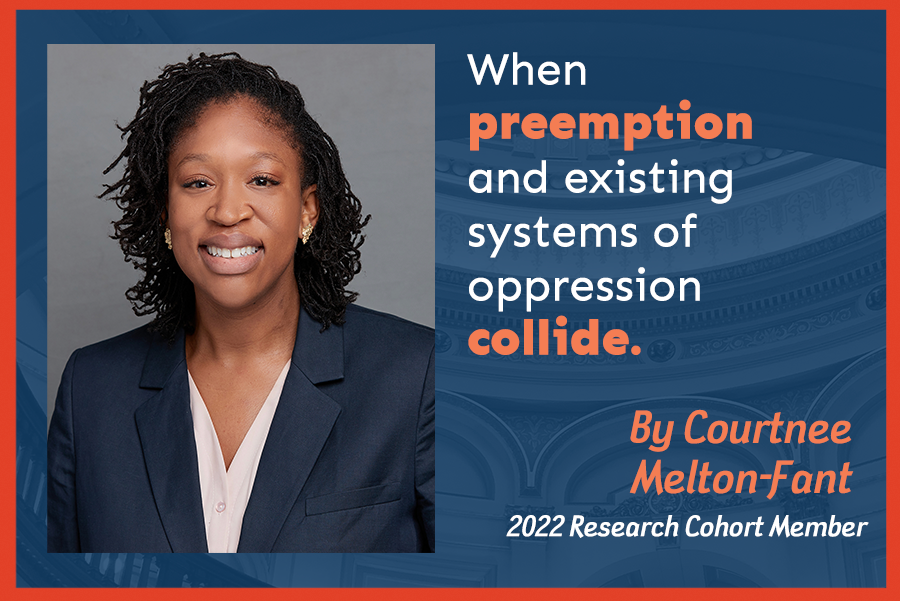When Preemption and Existing Systems of Oppression Collide
The Local Solutions Support Center is excited to continue a blog series featuring our 2022 Research Cohort. Each month, a member of our Research Cohort will explore a different topic and its connection to preemption. Here, Courtnee Melton-Fant shares the story of Boxtown, a majority black neighborhood in Memphis harmed by the abuse of preemption.
Preemption is not inherently positive or negative and should be examined using an equity lens,¹ and this lens should also include history. Contemporary uses of preemption often operate as a tool of structural racism that interacts with existing systems of oppression,² but what does this look like in practice?
The story of Boxtown, a majority Black neighborhood in Memphis, TN can help shed some light. After the Emancipation Proclamation was signed in 1863, formerly enslaved people and freedmen started a community called Boxtown. Boxtown is located in Shelby County, TN, the same county where the city of Memphis is located. Up until the 1960s, Boxtown was not a part of the city of Memphis and did not have access to city services like sewer lines, streetlights and signs, and police and fire services. In exchange for the provision of these services, Boxtown residents would begin paying taxes and be annexed into the city of Memphis. Annexation took place in 1968 and 1971 and Boxtown residents began paying taxes. However, the city of Memphis did not keep their part of the deal. Many of the homes in Boxtown did not receive water, sewer, and electricity services. The struggle for adequate services and investment from the city of Memphis has been an ongoing battle since Boxtown was annexed. Presently, Boxtown remains one of the poorest and underdeveloped neighborhoods in Memphis. Boxtown is also located near multiple industrial facilities, and the residents have often fought against environmental injustice. Research has found that Boxtown residents have significantly higher risks of cancer due to its location.³
“Combatting abusive preemption is a racial equity issue. Any efforts to address preemption and its harmful effects must consider the larger context and preexisting circumstances of the communities most affected.”
In December 2019, plans were announced to build the Byhalia Connection oil pipeline through Boxtown. Boxtown residents had concerns about the potential environmental and health risks associated with the pipeline and felt that neither the developers nor elected officials were being responsive to their concerns.⁴ The pipeline also threatened the water source for all of Shelby County, the Memphis Sand Aquifer. Some residents were interested in selling their land to the developers while others were not. The developers began taking Boxtown residents to court and using eminent domain to acquire the land for the project.⁵
On July 2, 2021, due to community organizing and grassroots efforts, the developers announced that they were no longer pursuing their project and asked state and federal officials to revoke the permits for the project.⁶ The city passed two ordinances in response to the pipeline fight. The first ordinance protects drinking water by creating a protected area around the city’s drinking water source from pollution, pipelines, and other infrastructure that may adversely affect health.⁷ The second ordinance requires permits for pipelines and other infrastructure projects that seek to use city rights of way and streets. The combination of these ordinances gave the city more regulatory authority over pipelines and underground infrastructure.⁸ However, this victory was short-lived. In January 2022, a bill was introduced in the state legislature to study infrastructure of utilities in Tennessee, including pipelines.⁹ At the last minute, an amendment was introduced that would preempt local governments from restricting development and implementation of energy sources¹⁰ – the exact kind of regulation that the Memphis City Council passed.¹¹ The preemptive bill passed and went into effect on July 1, 2022. The pipeline is no longer moving forward, and the community recently celebrated the anniversary of the pipeline cancellation.¹² However, the bill can be retroactively applied to the previously passed ordinances and threatens local power and autonomy over similar projects in the future.
Unfortunately, what happened in Boxtown is not an anomaly. The pipeline preemption bill is just one example of how the misuse of preemption is used as a continuation of racist policies and practices. Combatting abusive preemption is a racial equity issue. Any efforts to address preemption and its harmful effects must consider the larger context and preexisting circumstances of the communities most affected.

